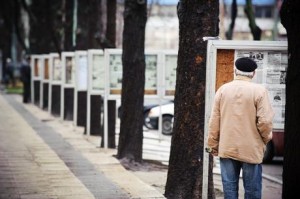
Officials from the Eastern European nation of Moldova were enraged in 2007 by Spain’s decision to issue a visa to a representative of a renegade breakaway republic, and even threatened to walk out of a ministerial meeting in Madrid.
The United States, which was drawn into the controversy, was able to calm the Moldovan delegation’s diplomatic discomfort but privately criticised the Zapatero administration for showing an “ineffective approach” in trying to resolve the ongoing conflict between Moldova and the separatist communist government of Transdniestria.
Details of the incident are contained in a confidential US Embassy cable sent from the Moldovan capital Chisinau and released earlier this month by Wikileaks.
On November 27, 2007, Vasile Sova, Moldova’s minister for reintegration, told then-US Ambassador Michael Kirby in Chisinau that his country planned to kick up “a huge scandal in response and walk out” of an upcoming meeting of ministers of the Organisation for Security and Co-operation in Europe (OSCE) that Spain was hosting.
Then Spanish Foreign Minister Miguel Ángel Moratinos was OSCE chairman-in-office at the time and was seeking solutions to the two-decade conflict between Moldova and the Transdniestria region known in Russian as Pridnestrovye. Talks had stalled in 2006, and one of Moratinos’s biggest objectives during Spain’s one-year term at the head of the OSCE was to restart them.
Before the ministerial meeting, which took place in Madrid November 29-30, 2007, Moldova learned that Spain had granted a visa to Valery Litskai, who serves as “foreign minister” to Transdniestria’s communist leader Igor Smirnov.
After Sova threatened to make noise at the OSCE meeting, Kirby said that he convinced the Moldovan minister to take “a more measured” approach and allow “others to do the complaining.”
“Let the other side be seen as the problem. An inflexible Chisinau would only serve the interests of hawks in Transnistria [sic] and Moscow,” the ambassador wrote. He added: “Though the Spanish had hoped to finish their [OSCE] presidency with a grand diplomatic flourish on Moldova, their gaffe in granting Litskai a visa without European consultations provided just one more proof of their ineffective approach.”
Kirby said he hoped the incoming Finnish presidency would “bring new momentum” to the peace talks.
In 2003, the European Union began imposing a travel ban that is reviewed annually against Moldovan separatist leaders, including Litskai, for their “unwillingness” to help reach “a peaceful and comprehensive solution to the Transdniestrian conflict.” However, the ban has been lifted on occasions so that Transdniestrian leaders can take part in ongoing talks with Moldovan officials and mediators.
After splitting from the Soviet Union in 1991, Moldova fought a bloody civil war with the mostly Slavic population who live east of the Dniester River and wanted to set up their own communist government. Since a 1991 ceasefire was declared, Russian peacekeepers have remained in the sliver of Moldovan territory near the Ukrainian border supporting the population which has declared itself independent. The de facto government led by 70-year-old Smirnov, a self-declared hardline communist, is not recognised by the European Union.
The Moldovan-Transdniestrian talks were jump-started recently when the OSCE, under Lithuania’s chairmanship, sponsored a meeting on September 9 between Prime Minister Vlad Filat of Moldova and Transdniestria’s “president” Smirnov in the German town of Bad Reichenhall.
Leave a Reply
You must be logged in to post a comment.